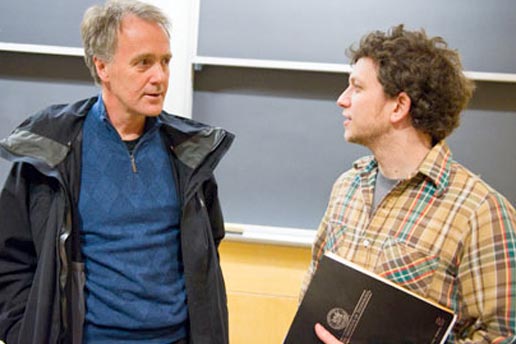
Times are tough for science reporters, perhaps especially for those covering the energy and climate science beat. In a January 31stpanel, MIT’s Knight Science Journalism fellows chronicled the challenges of negotiating a terrain where, in the words of Knight Fellowship Director Philip J. Hilts, “everything is so toxic and partisan.” A capacity audience at the event—which was co-sponsored by the MIT Energy Initiative and the MIT Program in Science, Technology and Society—engaged the four fellows in a lively discussion that touched not only on the hazards of science writing in a politically charged environment, but also on the changing nature of the profession in an age of blogs and social networks.
Panel moderator Hilts led with a provocative opinion article from The Wall Street Journal that denied evidence of global warming in the past decade—the kind of “attack piece,” said Hilts, that generates noise and confusion around the nation’s climate and energy discourse. Panelists, well-acquainted with this clamor, offered some strategies for cutting through it.
“A lot of our job is dealing with snake oil salesmen,” said Reuters environment correspondent Alister Doyle, as reporters “navigat[e] among the competing claims” about energy technologies, for instance. Although the “daily bombardment of advertisements from lobby groups” complicates the picture, Doyle focuses on a careful accounting of the costs and benefits of new technologies, whether renewable or fossil fuel. But he admitted that “trying to get enough sources for a proper view of what is real here is very difficult.”
Hepeng Jia, founder of China’s Science News Magazine, noted that while climate change is broadly accepted as a reality in his country, “the reporting on it is remote; there is no relationship to the ordinary lives of human beings.” He relishes communicating the debate on energy policy taking place in the U.S.—including on the editorial pages of its newspapers—because “good energy journalism should not simply tell facts.” Disputes can make “voices supported by strong evidence become stronger,” he said.
Science magazine policy reporter Eli Kintisch scans a “daily onslaught of hundreds of articles” seeking scientific findings that are “truly important, surprising and newsworthy.” He gains insight from “independent scientists uninvolved in the research,” whose judgment he trusts. But Kintisch admitted he is worried that the audience for his carefully vetted pieces is narrowing, as “people increasingly get the news they want,” making selections based on whether they “like the Sarah Palin or Al Gore view of the world.”
For Joyce Murdoch, former managing editor of the National Journal, “what happens in Washington in terms of energy policy totally reflects elected officials’ personal assessment of their own political needs.” One notable example, said Murdoch: the ethanol subsidy, which exists “because Iowa holds the first presidential caucuses.” She advises journalists to “get beyond political posturing and come up with coverage that is more scientifically based.”
Some audience members offered their own prescriptions for strengthening the voice of scientists and science reporters on matters of climate change and energy. “Follow the money,” said one. Given the powerful interests vying for attention in Washington, “just explain to us who’s paying for the arguments.” Others suggested that journalists play a more active role in influencing the public, when facts about energy and climate matters are so often misrepresented.
While the Knight panelists expressed little enthusiasm for joining the political fray—a partial reporter is a less authoritative and trustworthy source, after all—they encouraged audience members to step in. “That job is up to you, to put more voices in the system,” said Hilts. “Blogs may be what matter most in the end.” And Kintisch added that at a time when there are fewer traditional positions available to journalists, it is “perhaps easier for scientists with a Ph.D. or master’s, with some expertise, to make a name for themselves by writing a blog.” Former Knight Fellow director Victor McElheny drove home the point, reminding MIT students that “all of you are or will be practicing popularization of science without a license.”
One attendee, Ph.D. candidate Rebecca Gianotti, was taking all this advice to heart. A hydrologist and Martin Fellow for Sustainability, Gianotti plans shifting to a career in science journalism. While the panel confirmed her suspicions about the challenges involved, she remains intent on “finding stories that connect people to science in their everyday lives.” In her own new blog (Science and the World), she hopes to pique the interest of a public “that may not already choose to read” about important matters in science such as climate change. “If these stories were told in a more entertaining way, that was more about storytelling than conveying technical information, people would appreciate the relevance of science,” said Gianotti. “As soon as they have a connection to an issue, they can get invested in doing something about it.”
This article appears in the Spring 2012 issue of Energy Futures.